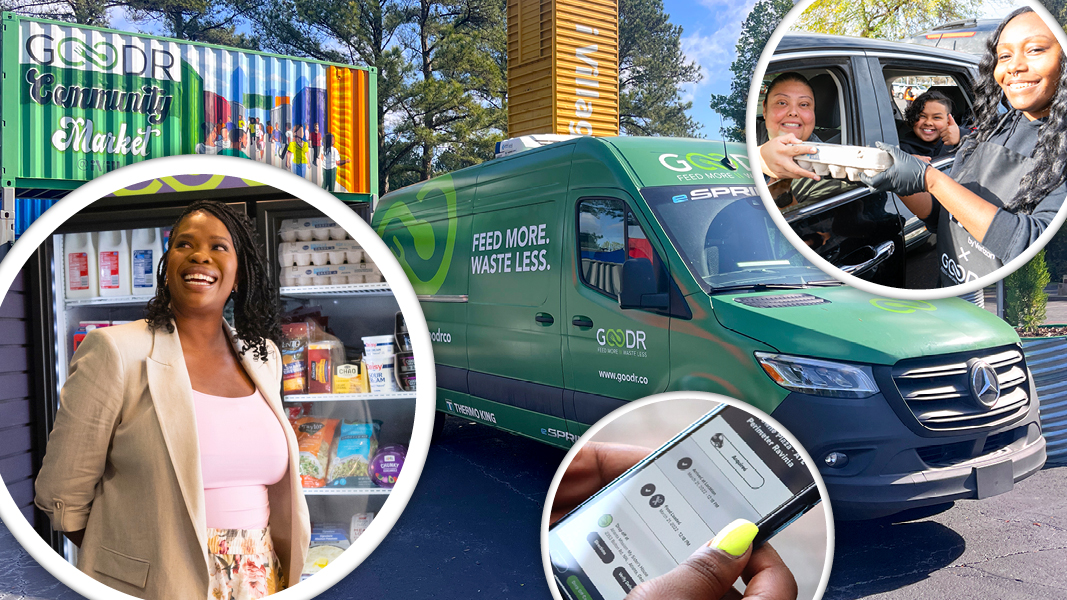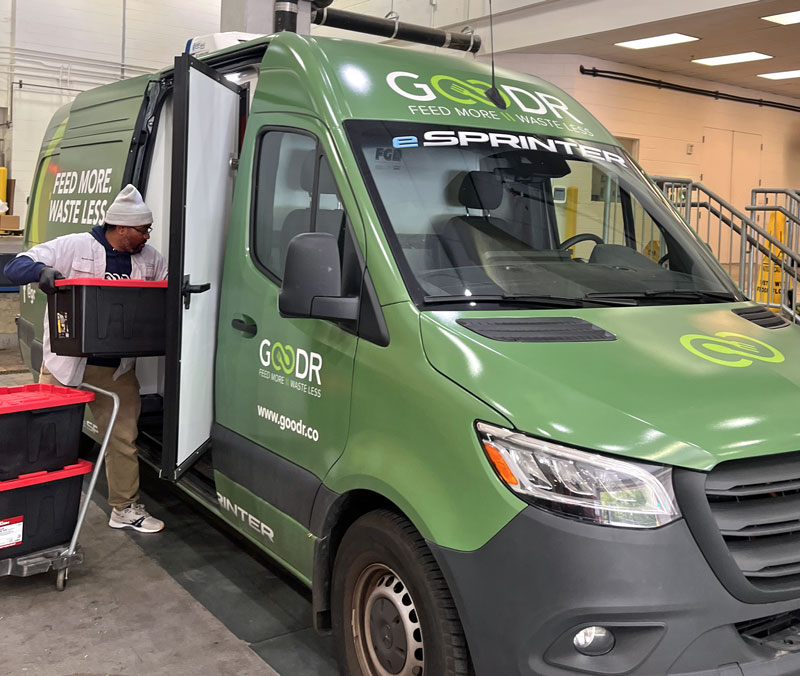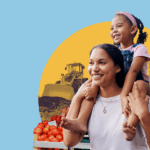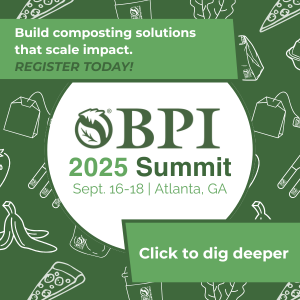Top: Goodr Community Market and company van (background), Goodr founder Jasmine Crowe (left inset), Goodr app displayed on smartphone (bottom inset), distribution of food rescued by Goodr (top, right inset). Photos courtesy Goodr
Juliana Beecher
Goodr’s company mission is based on an idea that’s simple on the surface: hunger is not an issue of scarcity but of logistics. Since its founding in 2017, the company has been working to solve the logistics problem of transporting perfectly edible but excess food from restaurants, grocery stores, cafeterias, stadiums and offices to places where the food can be accessed. At the same time, it’s addressing what could be described as another problem of logistics: wasted food. Simplifying “hunger” and “wasted food” down to logistical hurdles belies the complex systemic and structural nature of these profound social issues, but distillation can lead to clarity. Clear missions and messaging tend to have broader buy-in — something Goodr’s success has proven out. As the slogan on the company’s green vans read, “Feed more. Waste less.”
Origin Story
Goodr was founded in Atlanta, Georgia, in 2017 by Jasmine Crowe. Crowe volunteered at a food pantry when she moved to Atlanta in 2013. Having experienced food insecurity in her own household and community, and now appalled by the lack of dignity afforded to pantry patrons, she started thinking of other ways the charitable food system could be structured. Crowe was the founder of Black Celebrity Giving, a nonprofit that helped Black celebrities maximize the impact of their philanthropic dollars. With the backing of her nonprofit, she started a program called Sunday Soul in 2014, cooking and serving grab-and-go prepared meals (mostly soul food) at senior centers, highway underpasses, and other places in downtown Atlanta. Over the next 18 months, that program grew into a full-on formal restaurant experience, with printed menus, servers, and multi-course meals — a dignified dining experience served for free to community members facing food insecurity and homelessness.
A video from one of those dining events went viral in 2016 and commenters asked: Who donated all the food that was served? The answer was no one — Crowe and volunteers were putting together meals from ingredients purchased with philanthropic dollars. That was a turning point for Crowe. She learned how much food is wasted in the U.S., including ready-to-eat food, and began to identify ways to source donations of prepared food for her meal program while also putting surplus food to best use. At that time, rideshare companies like Uber and Lyft were expanding into food and freight deliveries. Crowe saw an opportunity to tap into those networks. Gig economy drivers could help move prepared food from restaurants and other food businesses to food pantries, soup kitchens and community meal sites.
Crowe founded Goodr as a for-profit company and started testing the model. In 2018, the company won a pitch competition and landed its first real client: the Hartsfield-Jackson Atlanta International Airport, the busiest airport in the world. Goodr contracted drivers directly (due to airport security requirements) and started rescuing food from the airport on a daily basis and bringing it to sites around Atlanta for distribution into the community. Additional funding came bit by bit through pitch contests, business incubators and accelerator programs. Over $1 million in venture capital was raised.
In 2019, Goodr’s clients started asking what to do with their inedible food scraps, leading the company to provide an add-on option for food scraps collection for recycling. Private haulers are contracted to pick up scraps and deliver them to local animal feed operations, commercial composting facilities, community composting sites at urban gardens, and anaerobic digesters. In 2021, Goodr expanded the suite of services it offers clients, adding collection of trash and recyclables for what it terms “holistic waste solutions.” Edible food is still the central focus, but complementary services provided by contracted haulers allow for all the materials associated with that edible food — the inedible parts and the compostable, recyclable, non-compostable, and non-recyclable packaging — to be managed in the same place.
Also in 2019, Goodr expanded beyond the Atlanta region to recover edible food. The company’s partnering with existing logistics providers or gig economy drivers in other cities enable the expansion and replication of Goodr’s services elsewhere.
Pandemic Pivot
In March 2020, when the Covid-19 pandemic hit, Goodr’s revenue stream disappeared as its clients shut down. At the same time, the need for food aid shot up. The company pivoted to respond to the needs of the moment. First, it helped to rescue and donate all the food that was stockpiled at Atlanta’s two big sports venues, the Mercedes-Benz Stadium and State Farm Arena. Next, the company won a contract with the City of Atlanta and started delivering meals directly to kids who qualified for free or reduced lunch but couldn’t reach school meal sites when schools were closed.
“Money was free and plentiful in 2020 compared to now,” notes Grayson Stuart, Goodr’s Sustainability Manager. Funding for Goodr poured in, including $100,000 from Spanx founder Sarah Blakely. In addition to the contract with the City of Atlanta, Goodr worked with Fulton County (where Atlanta sits) to deliver food to residents with co-morbidities who didn’t want to grocery shop themselves. The company also offered pop-up food markets where customers could shop for free in areas with limited food access.

Free grocery markets have been opened up in schools and community centers. There are also mobile grocery trucks and two brick-and-mortar stores.
Goodr’s business grew 10-fold over a few months in 2020 by focusing on the logistics of moving food around the Atlanta area and responding to the emergency circumstances of Covid-19. Then in 2021, the emergency funding started to dry up and Goodr sought opportunities to have a more consistent, long-term presence and impact in the communities it served. The company was already marketing itself as an “end-to-end hunger solution,” providing logistics for both food rescue and distribution. Goodr built its first free permanent grocery market in a school, launching an initiative that’s still a major focus in 2025. Since 2021, it has launched or is in the process of launching a total of 28 free grocery stores. The majority are built into schools and community centers; three are mobile grocery trucks and two are stand-alone brick and mortar stores. There was a lean year in 2022, when fundraising took longer than expected while Goodr was taking on its first multimillion dollar contract. Additional staff and resources required left a slim margin for error in the budget.
Business Model
Goodr’s business model is based on the premise that businesses want to get their surplus edible food to people who need it, and that they’re willing to pay for a logistical solution rather than identifying a nonprofit to donate to directly and managing regular deliveries in-house. In either case, the food business gets a tax write-off. Goodr’s revenue sources include contracts for surplus food recovery and organics recycling services, contracts for direct food delivery (such as meals for seniors), fees to access Goodr’s proprietary tech platform, and sponsorships for food access programs.
Organizations and corporations that want to support Goodr’s work but don’t have food to donate can sponsor the company’s “end-to-end hunger solutions,” which include pop-up free markets and student snack packs. Healthcare companies like Aetna, Elevance and Wellstar, corporations such as Amazon, Bristol Byers Squibb, and Verizon, and local governments like Dekalb County and the Cities of Atlanta, Birmingham and Denver all pay Goodr to deliver anti-hunger/food access programs to further their own missions or to increase their social impact. The Goodr Foundation — Goodr’s nonproft arm — works directly with nonprofits to help increase their effectiveness by offering microgrants for equipment, ServSafe training for community meal chefs, cooking demos, and additional programming.
Tech Underpinning
How does Goodr make all this happen? Through an app, of course. Its proprietary, custom-built app connects all the players in the Goodr game. Clients with surplus food request on-demand pickup, adding details about what and how much food they have, and how it’s packaged. Nonprofits report food donations received, update delivery preferences, and provide testimonials from food recipients. Clients with inedible food scraps or recyclables manage their recurring pickup service, interfacing with their local hauler. Gig economy drivers are scheduled through the Goodr app, which integrates with the apps of rideshare/delivery companies that actually contract the drivers. (Some clients with complicated pickups such as airports or special events are serviced by regularly-scheduled drivers.)

The app tracks and shares data on pounds of food diverted from landfill. Recyclable materials collected are included where relevant.
Simple on the surface, but complex on the back-end. When a client enters food for pickup, that specific delivery (time, type and quantity) is automatically matched with a nonprofit recipient in Goodr’s network. Goodr’s data must be up-to-date to ensure that the matched nonprofit is open during the time the food will be delivered. If food arrives at a closed site and can’t be delivered, drivers have to bring the food back to its place of origin per rideshare companies’ protocols — not something a food donor wants to deal with. Goodr’s team regularly checks in with nonprofit partners to make sure information on open hours and capacity to accept donations is accurate. Verifying that food donations are being distributed and inedible scraps are being recycled is core to Goodr’s mission.
To help measure social and environmental impact for Goodr and its clients, the app tracks and shares data on pounds of food diverted from landfill (including recyclable materials and scraps for composting, etc., where relevant) or pounds of food distributed; economic value of edible food that is donated (retail value); meals served (donated or distributed), calculated using the same standard as USDA and Feeding America of 1.2 lbs of food per meal; and carbon emissions avoided, calculated using EPA’s WARM model. As of the end of May 2025, Goodr has facilitated:
- 6,338,520 pounds of surplus food donated to nonprofits
- 5,282,100 meals served through donations alone and 35,005,615 meals served in total, including end-to-end hunger solutions
- 11,993 tons of food waste diverted from landfill
- 12,889 tons of CO2e emissions prevented
Goodr’s system automatically generates a tax receipt with each food donation so businesses can track their annual donations in terms of pounds donated and dollar value. Stuart sees this as Goodr’s competitive edge — the ease with which a business can both donate food and get credit for it as a tax write-off, plus track social and environmental impacts in real-time. The tech isn’t quite as advanced for the composting and waste solutions parts of Goodr’s business. “It’s a bit more manual,” Stuart notes. But the company is committed to tracking food scraps and recyclables past the scale at the gate of a facility through site visits and requests for documentation.
A common concern with donating food is food safety and the threat of making someone sick and getting sued. In actuality, the Bill Emerson Good Samaritan Food Donation Act of 1996 and updates made in 2023 protect almost all individuals, businesses, organizations and others involved in the donation and distribution of food and grocery products to those in need from liability. Goodr adds another layer of protection by taking on the liability for a food donation.
Future Plans
Today, Goodr operates in 19 states and 26 metropolitan statistical areas. “Our proprietary app and nonprofit network that we built and manage internally has been a huge part of what we have accomplished,” explains Stuart. “In addition, the success story we had with the Atlanta airport — our first customer — gave the company significant credibility in the eyes of large institutions of being able to reliably manage a large contract.”
Though Goodr has overcome some hurdles, more remain. It has not yet hit capacity for nonprofits in the Atlanta area to accept food donations, but the company can see that day coming. Meanwhile, those pantries and meal sites don’t serve everyone who could benefit from access to free food, so Goodr is evaluating how to improve access outside the opening hours and operating areas of its nonprofit partners.
Goodr’s tech has largely been successful, but there have been setbacks. Incorporating blockchain to verify food’s movement from donor to driver to distributor showed promise at one point, but the large number of transactions ended up slowing the system so much that it wasn’t feasible to actually use.
Another barrier Stuart sees is lack of incentives for donating food and composting scraps. Goodr thought that small restaurants would be their “bread and butter” as food donors, but the tax incentives for small businesses are almost nonexistent — they’re operating on such slim margins that they don’t pay much in taxes anyway. Phased-in food waste bans or donation and diversion requirements may help encourage more businesses to donate and divert, but Goodr would like to see such laws put in place with a focus on infrastructure first to ensure the capacity exists to manage edible and inedible food. Composting can be a hard sell to clients when landfill tipping fees are so low. Stuart notes that some clients balk at the prices of Goodr’s services, which vary depending on volume and region. Conveying the value of donating food and recycling scraps often starts with understanding a client’s budget and involves weighing not spending money now vs. getting a tax rebate later.
Funding continues to be a challenge for Goodr. Stuart notes that very little climate funding goes to methane reduction, which is where food diversion from landfills has the largest impact. Jasmine Crowe has become a celebrity in the food waste and donation space and Goodr’s work has consequently received more publicity in recent years. Still, less than 1% of venture capital funding goes to businesses founded by Black women. Grayson identifies two more contributing factors: a lack of incentives for food waste diversion and the cultural mentality that waste should be “out of site and out of mind.” Goodr’s focus now is on sustainable profitability from its food waste reduction and food access operations, minimized need for outside investment, and increased resilience to economic swings.
Juliana Beecher, a Contributing Editor to BioCycle, is a former ORISE Research Fellow with the U.S. EPA’s Office of Resource Conservation and Recovery. Now working as a consultant based in Portland, Maine, Juliana brings the food waste perspective to broader food systems conversations and efforts to build a more resilient food supply chain.

















